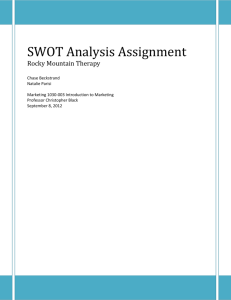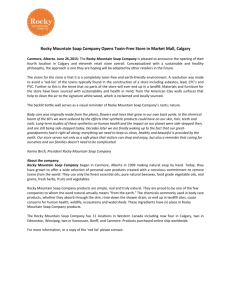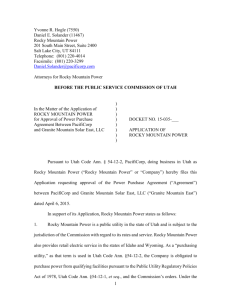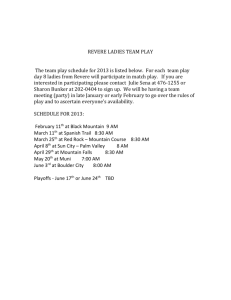Stephen F - Utah Public Service Commission
advertisement
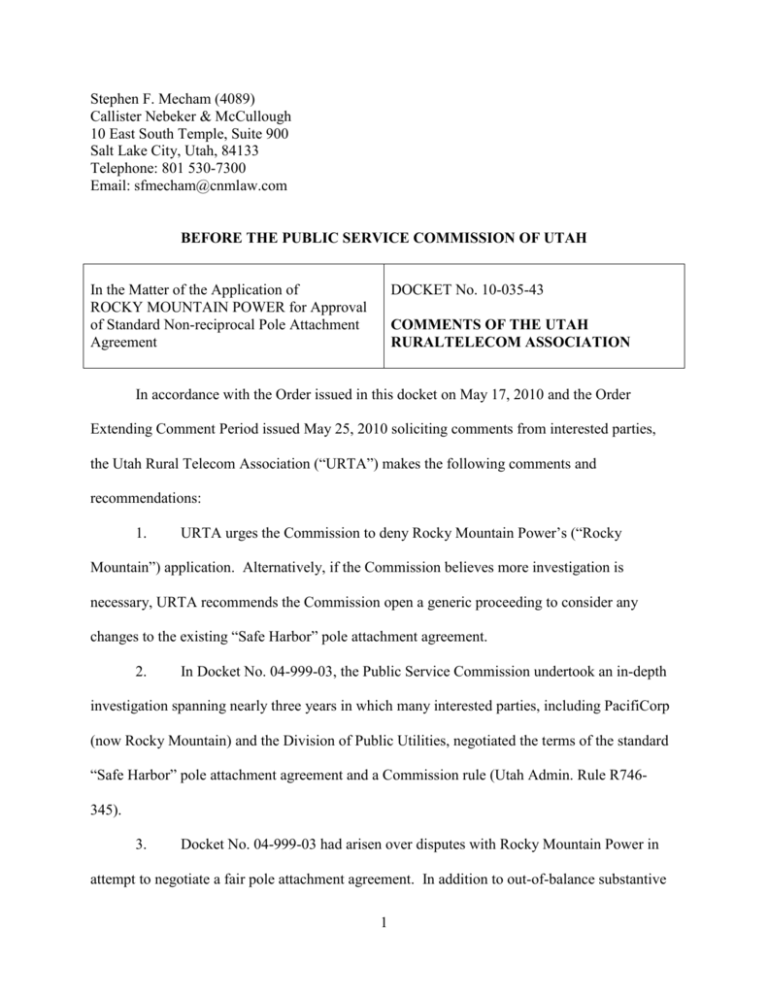
Stephen F. Mecham (4089) Callister Nebeker & McCullough 10 East South Temple, Suite 900 Salt Lake City, Utah, 84133 Telephone: 801 530-7300 Email: sfmecham@cnmlaw.com BEFORE THE PUBLIC SERVICE COMMISSION OF UTAH In the Matter of the Application of ROCKY MOUNTAIN POWER for Approval of Standard Non-reciprocal Pole Attachment Agreement DOCKET No. 10-035-43 COMMENTS OF THE UTAH RURALTELECOM ASSOCIATION In accordance with the Order issued in this docket on May 17, 2010 and the Order Extending Comment Period issued May 25, 2010 soliciting comments from interested parties, the Utah Rural Telecom Association (“URTA”) makes the following comments and recommendations: 1. URTA urges the Commission to deny Rocky Mountain Power’s (“Rocky Mountain”) application. Alternatively, if the Commission believes more investigation is necessary, URTA recommends the Commission open a generic proceeding to consider any changes to the existing “Safe Harbor” pole attachment agreement. 2. In Docket No. 04-999-03, the Public Service Commission undertook an in-depth investigation spanning nearly three years in which many interested parties, including PacifiCorp (now Rocky Mountain) and the Division of Public Utilities, negotiated the terms of the standard “Safe Harbor” pole attachment agreement and a Commission rule (Utah Admin. Rule R746345). 3. Docket No. 04-999-03 had arisen over disputes with Rocky Mountain Power in attempt to negotiate a fair pole attachment agreement. In addition to out-of-balance substantive 1 contract terms, Rocky Mountain had attempted to more than double its pole attachment rate and to impose unreasonable penalties for previous attachment violations. 4. In this docket, Rocky Mountain is asking the Commission to adopt a new “Safe Harbor” agreement based on two agreements Rocky Mountain privately negotiated with TCG Group and Leavitt Group Enterprises.1 In fact, in its application in this docket, Rocky Mountain represented that “[t]he proposed Agreement is substantially similar to the pole attachment agreements with TCG Utah and Leavitt Group Enterprises, approved by the Commission in Docket Nos. 09-035-52 and 10-035-01, respectively.”2 5. This is not the correct standard; the correct standard is how Rocky Mountain’s proposed Safe Harbor agreement (“Proposed Agreement”) differs from the current Safe Harbor agreement (“Current Agreement”). The Proposed Agreement deviates substantially from the Current Agreement. Though not comprehensive, the following issues are representative of how the Proposed Agreement is significantly different from the Current Agreement: a. The Proposed Agreement defines 11 terms not included in the Current Agreement. Some of the more important terms introduced by the Proposed Agreement include “credit requirements,” “material adverse change,” and “security.” b. In the Current Agreement, there are no provisions that allow Rocky Mountain to exercise sole discretion or judgment. In the Proposed Agreement, Rocky 1 Rocky Mountain’s proposed agreement may not apply to URTA members since URTA members own poles and the proposed agreement purports to be a Standard Non-reciprocal Pole Attachment Agreement, not a Joint Pole Agreement. Nevertheless, the terms proposed by Rocky Mountain in this docket could also be negotiated privately between two parties jointly owning poles and brought to the Commission for approval as a new joint pole safe harbor agreement. The process in this docket should be converted to a generic proceeding to allow all parties who may be affected by the proposal to participate. 2 Application at p. 2, ¶ 4. 2 Mountain is allowed to exercise sole discretion or sole judgment at least five times without input from other parties or the Commission. A noteworthy example is the imposition of a security requirement in the sole discretion of Rocky Mountain included in the definition of security and in Section 6.03 in the Proposed Agreement. The only way to avoid posting security is to meet credit requirements imposed by Section 6.04 of the Proposed Agreement. In Section 10.03 of the Current Agreement, the Commission, not Rocky Mountain is permitted to impose a bond or some other financial instrument to secure performance and only after a party makes application to the Commission for the security. Section 2.03 of the Proposed Agreement is another example of how control shifts to Rocky Mountain under the Proposed Agreement. This section allows Rocky Mountain, in its sole judgment, to reject applications for specified reasons. Section 3.02 of the Current Agreement requires Rocky Mountain to explain its rationale for rejecting an application and permits an applicant to challenge the rejection at the Commission. c. The Proposed Agreement gives Rocky Mountain control over the attachment of service drops. Section 3.03 of the Proposed Agreement allows an attacher to attach a service drop without prior approval, but the attacher must submit and pay for an application to Rocky Mountain within five business days. Rocky Mountain can unilaterally reject the attachment and require that it be removed. 3 Section 3.02 of the Current Agreement requires an attacher to follow normal attachment procedures, but there is no requirement to file or pay for an application. An attacher need only report service drop attachments on a quarterly basis and there is no provision for Rocky Mountain to mandate removal. d. Section 3.01 of the Proposed Agreement requires full payment for an attachment no matter when during the year the attachment occurs. The Current Agreement has no such requirement. e. Section 3.12 of the Proposed Agreement imposes an application fee to remove attachments and the attachment must be removed within five days of giving notice. Section 3.20 of the Current Agreement allows an attacher to remove an attachment at any time without making application or paying a fee. f. The Proposed Agreement imposes a higher insurance requirement than the Current Agreement. Section 6.01 mandates $1,000,000 of coverage for each occurrence, $2,000,000 in the general aggregate, and a $5,000,000 umbrella policy. Section 10.02 of the Current Agreement requires a single limit of $1,000,000. 6. The purpose of the Current Agreement is to ensure that a pole attachment applicant has an option to use immediately if it cannot come to terms with Rocky Mountain. Widespread disagreement with Rocky Mountain precipitated the opening of Docket No. 04-99903. The Proposed Agreement supplants Commission authority to the detriment of applicants attempting to attach to Rocky Mountain’s poles. The Proposed Agreement shifts more control of the pole attachment process to Rocky Mountain. It is a significant step backward and a 4 tremendous waste of resources expended in Docket No. 04-999-03 to adopt a replacement agreement now based on private negotiations of two parties when the Current Agreement was negotiated by and acceptable to all interested parties. 7. URTA respectfully urges the Commission to reject Rocky Mountain’s application and to maintain the Current Agreement as the option for applicants who cannot reach agreement with Rocky Mountain. In the alternative, if the Commission desires more investigation, URTA requests that the Commission open a generic docket in which to review the Proposed Agreement and to determine if the Current Agreement should be amended. Respectfully submitted this 15th day of June, 2010. Callister Nebeker & McCullough ___________________________ Stephen F. Mecham 5 Certificate of Service I hereby certify that on June 15, 2010, I emailed a true and correct copy of the Comments of the Utah Rural Telecom Association in Docket No. 10-035-43, In the Matter of the Application of Rocky Mountain Power for Approval of Standard Non-reciprocal Pole Attachment Agreement, to the following: Michael Ginsberg Assistant Attorney General 160 East 300 South, Fifth Floor Salt Lake City, Utah 84111 mginsberg@utah.gov Paul Proctor Assistant Attorney General 160 East 300 South, Fifth Floor Salt Lake City, Utah 84111 pproctor@utah.gov Daniel E. Solander Rocky Mountain Power 201 South Main Street, Suite 2300 Salt Lake City, Utah 84111 Daniel.solander@pacificorp.com Barbara Ishimatsu Rocky Mountain Power 201 South Main Street, Suite 2300 Salt Lake City, Utah 84111 Barbara.ishimatsu@pacificorp.com /s/Stephen F. Mecham 6


